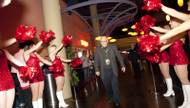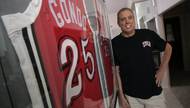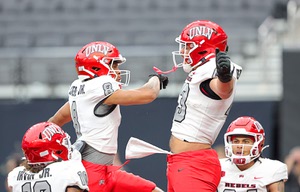UNLV’s most successful team isn’t the beloved basketball squad that graces billboards around town, or the football team that broke hearts against UNR last weekend after scoring 21 unanswered points in the first half. No, the most successful team on the UNLV campus is one that competes wearing cowboy boots and wide-brimmed hats: rodeo. For the last 22 years, Ric Griffith has been head coach of the UNLV rodeo team, leading them to 14 team and individual national titles. Over the phone from a rodeo in Susanville, California, Griffith took a moment away from the ring to talk injuries, mental toughness and one very muscular horse.
How did you get started in rodeo? Through my father. He was a horseshoer, and we were just around horses and stuff like that. I competed for, oh, too many years—my whole life. I rode bareback horses when I was younger, and then I calf roped and steer wrestled mostly.
Did you sustain any major injuries as a competitor? Yes, I’ve had 12 operations—broken my back and neck and knees and lots of bones.
How do you find your athletes for the UNLV rodeo team? Do you hold tryouts? I have a lot of kids send me videos. Basically, kind of like any other team—basketball, football, whatever. I have about 200 kids apply each year. I’ve got 14 kids [on the team] this year. We turn away quite a few, because I just can’t manage it.
Do you have to recruit? I try to get the cream of the crop, and everyone actually really knows that.
I’ve only seen professional rodeo. How does college rodeo compare? Almost half of the students I have are professional cowboys or cowgirls. They go to pro rodeos, too. A lot of them win at a lot of the pro rodeos.
If you’re coaching pro-caliber riders, do you run into big egos? No, I really don’t. With me being older—and I’ve actually rodeoed my whole life—I might have that with some kids out of high school, but as soon as they get around me and I’ll say stuff to them, they’re like, yeah, that guy’s right. After the first week, everything changes. It’s like a reality check.
How do you get somebody mentally ready to get on a bull? Every person is different, so I handle one kid one way and one kid another way. I might be a little rough on one and the other one I can’t be, just because they don’t take it as well. Some of them mentally like being tore up and then brought back down. And some of them like to be coddled a little more.
What’s the key to staying on that bull? A lot of it’s balance and a lot of rhythm and a lot of hard try. A lot of rodeo comes from the heart—on all the events. In bull riding, it’s a tough, rough sport. Actually, we’ve had some of the best bull riders in the world go to UNLV, like Justin McBride, he went to school here, too.
How much rodeo culture is in Las Vegas? There’s a lot more than what people really think. The horse community is a lot bigger than most people would imagine. … There’s an event almost every weekend—barrel racing, team roping or something in Las Vegas that people don’t really realize.
Do you have a horse right now that is your favorite? Yes, there is, and I let several of the students use him also. His name is Steroid. He’s so muscle-y he looks like he’s on steroids. We did it as a joke and it stuck with him.
Who’s your biggest competition nationally? Where are the other really good college rodeo kids? I don’t know, because I got them all (laughs). Texas is very competitive, too. [But] we’ve always been on the map here. Our women’s teams have been in the Top 5 for five years, and our men’s team is winning the region right now. We’ve won the nation 14 times.









Previous Discussion: